What's Happening?
Ford CEO Jim Farley has raised concerns about the labor shortage affecting the blue-collar workforce, particularly among Gen Z workers. During the Ford Pro Accelerate event, Farley shared insights from conversations with young factory employees who reported needing multiple jobs to make ends meet. This revelation has prompted Farley to focus on the 'essential economy' and the challenges faced by blue-collar workers. He highlighted the shortage of skilled technicians and factory workers, estimating a deficit of approximately 400,000 in each category. Farley emphasized the need for robust apprenticeship and vocational education programs to address the skills gap and support the essential economy.
Why It's Important?
The labor shortage in the blue-collar sector poses significant challenges to industries reliant on skilled trades, such as manufacturing and construction. As the demand for infrastructure related to artificial intelligence and data centers grows, the lack of skilled labor could hinder economic progress and technological advancements. Farley's call for increased investment in vocational training and apprenticeship programs is crucial for developing a workforce capable of meeting these demands. Addressing this issue is vital for maintaining the competitiveness of U.S. industries and ensuring economic stability.
What's Next?
Farley's advocacy for vocational training and apprenticeship programs may influence policymakers and industry leaders to prioritize investments in these areas. The push for a shift away from traditional four-year degrees towards trade skills could gain momentum, potentially leading to policy changes at the federal and local levels. As industries continue to face labor shortages, there may be increased collaboration between companies, educational institutions, and government entities to develop solutions that address the skills gap and support the essential economy.










